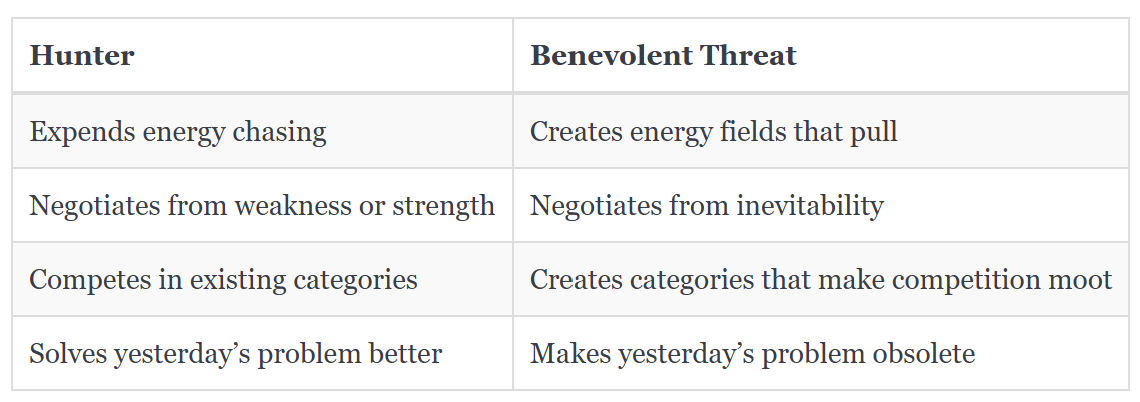Why the Market Doesn't See You: The Psychology of Becoming the Ultimate Opportunity
Stop hunting for attention. Engineer a position so specific, the market must reorganize around you. Read the Threat Doctrine now.
The modern professional is exhausted—but not from labor. The exhaustion is subtler, deeper: it is the fatigue of perpetual supplication. You wake each day in full pursuit mode—proposals to strangers, résumés tailored to gatekeepers, networking events where you exchange business cards like lottery tickets—anxiety rising with each unanswered follow-up.
This is the Hunter’s Paradigm: a reactive life of constant readiness to pounce on someone else’s scraps. School, degrees, and LinkedIn all reinforced the same message:
“Prove you’re worthy, compete for position, earn your seat at the table.”
You followed the script. You became skilled, persistent, professional. Yet now, fifteen–thirty years in, the promised land is still a mirage. Your hard-won expertise has been flattened into a profile, your worldview compressed into keywords. You have become competent—and invisible. The reward for fitting in is that no one can see the difference between you and the next applicant.
Confession: The Quiet Death of the Commodity Hunter
I know the terminus of this hunt because I lived it.
For fifteen years I wore the corporate armor of a retail-banking lifer. From the outside: steady paycheck, progressive titles, respectable benefits. Inside: a fundamental mismatch between who I was and who I was pretending to be. Each morning I fastened a mask of competence over a soul quietly suffocating.
Here is the insidious trap: the Hunter mindset glorifies the cage. I had caught the job everyone was chasing. To question it felt like ingratitude; to leave it felt like insanity. Year after year, my world shrank to fit the contours of a life I had never chosen. When new opportunities flickered, my Inner Lawyer produced a litany of rational prisons: mortgage, recession, wrong timing, insufficient credentials.
Eventually the body speaks. Mine did on an insignificant Wednesday during yet another strategy meeting bloated with acronyms. A single realization landed with physical force:
“I cannot rent my life from other people’s priorities for another decade.”
The hunter who never questioned the hunt had become the hunted—captured not by a better predator, but by his inability to imagine a world without fences.
The Threat Doctrine: Switching from Prey to Apex
The reframe that snaps the cage open:
Stop trying to be the best hunter. Become the ecological inevitability.
A Benevolent Threat is not aggressive; it is gravitational. It does not chase, pitch, or persuade. Its mere existence reorganizes the priorities of those who encounter it.
This is not “confidence.” It is competence so crystallized that comparison collapses. The Threat is the only chemotherapy for a cancer, the sole key to a lock, the single answer to an unformed question.
Stop aiming to be chosen. Architect the position that makes choosing you obvious.
Forge Yourself into a Weapon (in Three Moves)
1. Abandon the Common Battlefield
Trying to be better keeps you in the same arena, judged by the same judges. The move is to get illegible to the old game, not to win it. Accept temporary invisibility in exchange for eventual inevitability.
2. Engineer the Unique Skill Stack
Stop asking what you’re “passionate about.” Ask: Which combination of domains, when merged, generates compound value no one else can replicate?
My own mutation combined:
• Business strategy (for credibility among operators)
• Analytical psychology (depth on sabotaging patterns)
• Artificial intelligence (future leverage most advisors fear)
• Educational design (turning insight into replicable systems)
Each layer is common alone. At their intersection, I became a category of one.
Your algorithm: (rare domain #1 + rare domain #2 + proprietary method) multiplied by relentless iteration.
3. Deploy the Minimum Viable Magnet
Broadcast frameworks, stories, and artifacts that reveal—but do not exhaust—your value. Let the market test the transformation for free. The people who experience 20 % benefit will seek the remaining 80 % at premium pricing.
Your magnet might be:
• A diagnostic scorecard
• A public case-study breakdown
• A single high-leverage concept (my “Control what you can control”)
Gravity > hunting. Demonstration > persuasion.
Rebuttal to the Inner Lawyer
“This feels arrogant.”
False humility is fear in monk’s robes.
Arrogance is loud insecurity. A Benevolent Threat is quiet inevitability built on demonstrated skill.
“I don’t want to threaten anyone.”
You are threatening mediocrity, not people. Your competence makes stagnation uncomfortable—for you and for anyone who feels the gravitational pull of a higher standard.
“The market is saturated.”
Noise is saturated. Disturbance is scarce. Become the disturbance that rearranges priorities.
The Binary Choice
You can stay a Hunter—forever optimizing for a system designed never to crown you king.
Or you can undergo the metamorphosis into a Benevolent Threat—becoming so specific that your absence creates a void no competitor can fill.
The hunt is optional. The gravity is strategic.
If you’re done renting attention, let’s map the skill stack that makes you inevitable. The “10× Obstacle Audit” reverse-engineers your hidden advantages—only two slots remain.
DM me the word AUDIT.





